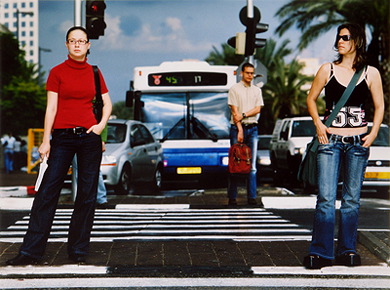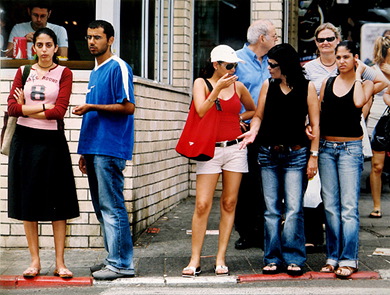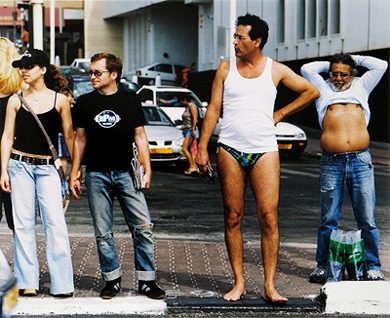 November 06
November 06
Boruchov Street
Jerome Eric Copulsky

I was searching for Boruchov Street.
In the early afternoon, after the rain, I went searching for Boruchov Street. It wasn't on the map, this Boruchov Street, not on the one in my guidebook anyway, but at the hotel I was told the general direction of Boruchov Street and noted it on that page with the map with a pencil. I left my hotel near the sea, my book in hand, wearing my worn wax jacket that I bought years ago in England in case of further rain. I walked south, in the direction marked on my map, heading for Boruchov Street, with my camera. I brought my camera, my father's old Nikon, to take pictures for my uncle. The streets were wet and reflected the buildings lazily. I took a left and walked eastward two blocks, turning then south onto Dizengoff. I marched down Dizengoff, a famous street where tourists flock. But as it was the Sabbath the stores that line both sides of the street were closed. So I was alone, walking towards Boruchov Street, in the hazy early afternoon, and the stores along Dizengoff were closed. When I began my search there were few people milling about Dizengoff. It was the Sabbath, after all. But I was off to find Boruchov Street.
I did not want to go to Boruchov Street particularly. I wanted to sleep late, find an open café and sit and drink, and, if I could, find a copy of the Herald Tribune for information about America, which I half-heartedly missed. But I had promised my uncle. So I continued south down Dizengoff, past closed souvenir shops and empty falafel stands, staring at slowly shimmering reflections on the wet streets and at the small number of people who also happened to be walking along Dizengoff or bravely sitting at tables outside the few open restaurants, mocking the clouds or the holy day. I wanted to join them, to have a casual lunch. I wanted to have a bowl of chicken soup with kreplach and a slice of warm bread, or Jaffa oranges and Arab sweets, and overhear talk about politics, and stare at pretty girls fresh from the army. But I had to find Boruchov.
It was vexing to me that Boruchov Street wasn't on the map, even if it was such a small street. It made it more difficult to find, despite the help of the woman at the hotel by the sea, the pretty, freckled young woman with what I guessed was a South African accent who said yes, she had heard of it, that it was south, towards the Yemenite Quarter, yes, but not that far, and further east. I asked if she had a better map, for girls who work in hotels often do, and she shook her head and took mine from my hand and pointed to a blank space on it, a white crooked trapezoid, and said she believed Boruchov was somewhere there, in that blank space, and I marked the location in pencil. It was fairly simple to get there, she said, and to prove it she traced the route with a slim, ringed finger, down Dizengoff and unto King George to Rothshild which led into the white emptiness.
It was still early when I left the hotel by the sea and the sky was gently gray and I couldn't be sure if it was or was not going to rain again, but as I forgot my umbrella in Jerusalem it did not have much further effect on my preparations. I put my camera in my backpack to keep it dry. I continued down Dizengoff, gazing in the storefronts as I passed them by. Their names were in Hebrew but I thought that otherwise the stores could have been in an American city, or somewhere else, like Paris, perhaps. The city wasn't all that strange.
Yet it was important that I find Boruchov Street, and that I take pictures. Boruchov was a relative, or so I was told by my uncle, who knew. He had looked it up. Now I passed by an open falafel stand. A shwarma cost twelve shekels. A group of young Israelis stood around damp wooden benches and talked amongst themselves. I would have liked to join them, to hear their stories, to have them lead me to the places only natives knew about. The grizzled man behind the shwarma stand cut the strips of meat from the spit and they fell into the pita in his left hand. I put salad, tehina and the hot red sauce on my shwarma, which they make out of turkey and roasted on an upright spit but I heard used lamb fat on top for flavor. I ate it carelessly while I advanced toward for Boruchov Street, and again looked at my map, even though I knew I had a long way to go.

I ate the shwarma as I walked. Along the way I thought of Boruchov. I had never heard of him. Not until my uncle told me a few weeks ago. "Go. Find Borochov our uncle." I licked the sauce from my fingertips. Some fell on the page, near the sea. I wondered if the rain would start again. It looked as though it were clearing up. I continued along Dizengoff Street, checking my map from time to time although I knew I had a way to go until I hit King George Street, where I would have to turn. I walked slowly, staring into the store windows, looking at fine suits made in perhaps Milan and books with Hebrew and sometimes English titles, silver menorahs and mezuzahs made of pink Jerusalem limestone, like that city itself. During the day, the guide book proclaimed, the stone exterior of all of Jerusalem is blanched white, but, towards dusk, as the sun falls, it fades to a soft pink, like the little rectangular boxes in the window, which hide tiny parchment scrolls.
And so past Gordon, past Frishman. Further along the sidewalk rose up to Zina Kikar where that terrible sculpture spins around and shoots up water and fire when it deems appropriate. From the square I could see the ugly antennae protruding like awkward crucifixes from the buildings across, and the pink and turquoise of a hotel's signs. There were a group of people about the square, some children dangling from their parents, a seller of balloons. I walked on. I had no time for balloons or children and their parents or colorful spinning sculptures spitting water and fire. I was looking for Boruchov. Dov Ber Boruchov, 1881-1917, the Zionist-socialist, uniter of the Poale Zion parties. In Jerusalem I asked a Zionist I had met if he had heard of Boruchov, and he said, "Of course." Of course he did; all Zionists knew of Boruchov, as did Israeli schoolchildren, who I believed were taught of his exploits in school. It was peculiar, though, that it was my uncle who was the one to tell me.
From the square where children roved free from their parents and surrounded the balloon man with their pleas I walked back down unto Dizengoff Street, which now eased to the left. I wondered what it would be like, Boruchov Street. Would it be industrial or residential? I had not been told. I hoped it would be residential. I hoped it would be idyllic, in the way innocent socialists muse. Uncle Boruchov was a socialist, a Zionist-socialist, the first to synthesize Zionism and Marxism. I wondered what it meant to be related to this Boruchov, a man I had never heard of, until my uncle told me, if it meant anything at all? I was not really a socialist, and I was not altogether sure if I was a Zionist, either, even though I had been told that I should be, by teachers years ago in Hebrew school who taught me tribal songs and recounted stories of heroic soldiers in the desert, and by the Zionist I met in Jerusalem who wore a knitted yarmulke and said yes, he knew of Boruchov. Becoming a Zionist would mean that I would have to commit-selling my belongings, leaving my father's house, learning Hebrew.

It was strange that my uncle told me. My uncle is a psychiatrist and, I believe, an atheist, although I have never asked. He told me about Uncle Ber last Thanksgiving, after much turkey and wine. After the meal, he took me into his office and in the light of his desk lamp showed me a series of clippings from encyclopedias and books. I had not known about Uncle Ber, as he referred to Boruchov, or even that I had an Uncle Ber, before he told me. He told me that there was a street in Tel Aviv, and that I should find it when I came. And that I should take pictures, and send him copies, so he would have a memento of Uncle Ber. So I walked down Dizengoff, which is a very famous street, known around the world it seems, like Broadway or the Champs Élysées, though few have heard of Boruchov. There are no statues or grand portraits of Boruchov, no teeming city squares which bear his name. I did not know what he looked like. He could have looked like my uncle, who is a handsome man, who would look at home in this city, with an apartment overlooking the sea. I could resemble him, for all I knew, with my few days of whiskers and almond eyes. But here I learned that he is not even on my map. Nonetheless, I thought it is meaningful to be related to someone with a street named after him, even if it is a small street, even if it is not on the map, which is why I hoped it would be a nice street, a residential one, with modest houses and young children playing in front. The street would be wet with the recent rain and would reflect the images of the children playing. Their colorful garments would form animated rainbows on the ground. That is what I would have liked. I wondered what Boruchov would have wanted. I wondered if a street with modest houses and children playing in front might prove too bourgeois for a Zionist-socialist. I hoped he would approve, but I thought it was more important that the street was to his liking rather than mine. I promised myself when I returned home I would look up Boruchov in the library, that I would learn all I could about Boruchov, that I would read all his speeches and essays, those, at least, which were translated. Perhaps I would learn what he looked for in a street.
I wondered why my uncle wanted pictures. He was, after all, neither socialist nor Zionist: he was not particularly Jewish, for that matter, married, as he was, to an Ohio Catholic. They celebrated Easter with eggs and Hanukah with latkes and Christmas with a tree laden with twenty-six years of ornaments collected from a twenty-six year marriage. Why had he taken so much interest in Boruchov, his great-great uncle? Was it because he was getting old? Because he thought it was meaningful that he was related to Boruchov? It didn't make any sense that he wanted to find Boruchov, yet he was the one who had originally done so, in an old edition of Encyclopedia Judaica.
Searching for Boruchov, I passed Bar-Kochva, Bar Giyora, the American restaurants and movie houses and the Dizengoff Centre, with its shops and restaurants. . .










